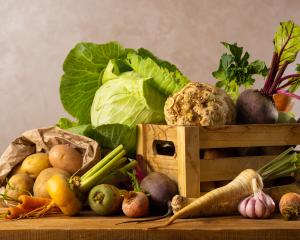David Sumter is a big supporter of a Dunedin food bank campaign that asks people to plant an extra row of vegetables for needy families.
The 76-year-old retired lawyer supplies the Anglican Family Care food bank with fresh vegetables and four to six litres of homemade soup each week.
Making soup is a "nice winter morning occupation", he says, explaining he delivers it frozen, in one-litre yoghurt pottles.
"It's no big deal. It's a lot of fun and something anyone can do."
Similarly, he reckons it would be easy for gardeners to put in an extra row or two of vegetables for the food bank.
Having a vegetable garden has become not only "fashionable" but a necessity when cauliflowers and cabbages sell for $3 to $4 each and small broccoli heads for $3, he says.
"For $3, you can buy six cauliflower or cabbage seedlings and in eight weeks, you've got the produce."
The Anglican Family Care food bank is one of four in the city and gives out about 2000 food parcels a year.
Child and family support service supervisor Debby Newton says most of those go to people on domestic purposes, sickness and invalid's benefits but 250 clients in the past year were waged families.
"We've noticed in the last few months that we're seeing an average of 30 new families a month - people who haven't used a food bank before - and we put that down to rising costs."
"People are getting hit by the high costs of food, power and petrol. When you're on a fixed income and everything else is going up, it only takes one little thing like a health issue and extra visits to the doctor or pharmacy to throw your budget out."
The campaign is designed to increase the nutritional value of the food parcels, and show that people can help out without going to huge expense, she says.
"I'm a gardener myself and I know if I plant six cabbages, they will all come on at the same time. Some people swap surplus produce or put it in their compost bins. This is another way of using it and getting healthier food into the food bank."
Information about the campaign has been sent to garden centres and to schools, many of which now have vegetable gardens.
The organisation is also running weekly cooking classes for clients and referring some of them to parishioners who will help them put in their own vegetable gardens.
Mr Sumpter and wife Liz have a large vegetable garden at their Doctors Point home and are almost self-sufficient in vegetables, only buying onions and pumpkins.
But the couple say people don't need a large area to cultivate vegetables - they can also be grown in the flower garden, and in pots, wooden troughs or plastic buckets that have drainage holes in the bottom.
The pair grow enough potatoes to last themselves and their son the entire year and last time they dug the main crop, decided to fill the area with cauliflowers, cabbages and broccoli for the food bank.
The soup-making began three months ago when the parish life committee Mr Sumpter is on at St Paul's Cathedral heard there was a need.
Two other parishioners do the same, one of them an "almost 90-year-old" whose specialty is kumara soup.
Mr Sumpter, who has grown vegetables for as long as he can remember, says making compost and aerating the soil with a hoe are important.
Having a garden requires reasonably constant work but being able to go out and dig a carrot or a leek makes it worthwhile.
"It's really fun to have fresh vegetables every day."
While rising food prices are behind many vegetable gardens, others are keen to promote healthy eating.
United States First Lady Michelle Obama recently planted fruit and vegetable seedlings in a new White House garden and Queen Elizabeth has given the royal seal of approval to a new vegetable patch at Buckingham Palace, the first cultivated there since World War 2.
Nichol's Garden Centre manager Karen Speer says there has been a "huge" increase in sales of all types of edible plants, from fruit trees to vegetables.
"If you look at flower punnets as opposed to vegetable punnets, 70% are vegetables now and 30% are flowers, whereas a few years ago, it was much more the other way and people planted for decoration."
Orders for fruit trees are the highest she has seen in her 10 years at the centre and many are going to people who have never gardened before.
Barrie Mayfield started the Dunedin Vegetable Growers Club in September 2006 after placing an advertisement that attracted 30 responses, and has since seen membership rise to nearly 60.
He says there are two reasons for the increase in vegetable gardening.
"The economics of it is one and people are becoming more conscious of what's put into the ground and the chemicals used on commercially-grown crops. By growing your own, you've got some control over that."
Help out
Surplus vegetables for the food bank can be dropped off at the Anglican Family Care Centre, 36 Bath St, between 9am and 4.30pm Monday to Thursday and between 10am and 4.30pm on Fridays.
For more information, telephone Debby on 474-7272 or Susan on 474-7410.
How to start a vegetable garden
Now is the ideal time of year to start developing a plot if you haven't already got one, says Barrie Mayfield, president of the Dunedin Vegetable Growers Club.
He offers the following tips:
• Ideally, choose a north-facing site that gets plenty of sun. Protect the garden with windbreak if necessary and don't site it too close to trees as the roots will compete with the vegetables for nutrients.
• Clear an area of lawn by taking off the turf, turning over the ground and breaking it up.
If you don't plan to plant root vegetables or potatoes, apply a light dressing of lime. Then leave the ground fallow over winter.
• Raised beds are easy to access and warm up quickly because sunlight can reach the sides.
They should be no wider than 1.5m so you can work in them from the sides. The beds can be filled with soil or compost.
• Organic and mushroom composts are available from garden centres.
However, gardens containing compost are not suitable in the first year for root vegetables such as carrots, parsnips and beetroot because fresh compost causes their roots to split.
• Small seedlings and plants like brassicas, silverbeet and lettuce can usually be planted out in late August or early September.
Early seed potatoes can be planted after the last frost.
• A few cloches placed in the garden in late July or early August will warm up the ground, so you can plant a few weeks earlier than usual.
• Seeds need to be covered and no more. Small plants should be replanted at the same depth as they were in the trays that they came in.
• Easily-grown vegetables include lettuces, silverbeet and brassicas (especially cabbages).
• Once young plants are established, water them every day or two.
• Compost helps create suitable conditions for growth and can be spread between plants to suppress weeds. Feed plants regularly with a complete garden fertiliser, following the instructions on the pack.
• If possible, rotate vegetable crops each season to reduce the build-up of pests and diseases.
This is particularly important with brassicas such as cabbages, cauliflowers and broccoli, which can otherwise get club root.
• To deter white butterflies from brassicas, sprinkle household flour over the plants or make a spray by boiling up the outside leaves of lettuces or rhubarb.
To deter slugs and snails, sprinkle coffee grounds around young plants.
Learn more
The Dunedin Vegetable Growers Club meets every second Monday of the month, except June and July, at 7pm in the St Patrick's parish centre, 42 Macandrew Rd, South Dunedin, and welcomes visitors.












